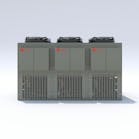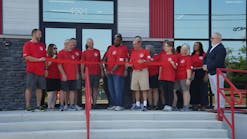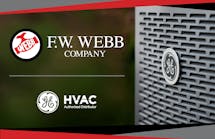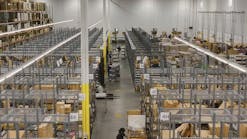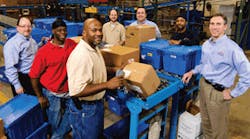Customers and suppliers know C.C. Dickson Co. as a company that's easy to do business with — you can experience it for yourself by visiting any of its 114 stores in nine southeastern states and talking to any of its employees. So why did the company last year embark on an initiative to provide even more thoughtful customer service, which included a one-day training program for every employee? Because there's always room for improvement, says Jon Perry, C.C. Dickson Co.'s president.
And that, in a nutshell, helps to explain the success of this company that started in 1933 and continues to expand to this day. This is a company that understands the value that its people bring to customers. When a C.C. Dickson Co. employee works with a customer, he or she is C.C. Dickson Co. “We've always done a good job with customer service, but this is a real differentiator,” says Perry, who also took part in the training. “In this market, a lot of people have good products and good locations. Our people are our most important asset, and I think this is the difference to our customers. You have to provide that extra level of service.”
Based in Rock Hill, SC, C.C. Dickson Co. was founded as a refrigeration wholesaler and later added HVACR supplies to its distribution. It quickly grew to five branch locations. After members of the Dickson family acquired the business in 1953, it expanded rapidly in North Carolina, South Carolina and Georgia. By 1974, there were more than 40 branches. Shortly thereafter, the company began another growth spurt into Tennessee, Alabama, Florida and Virginia.
As one of the largest HVACR distributors in the southeastern United States, C.C. Dickson Co. has the presence, backed by its people, to offer customers pretty much anything they want when it comes to HVACR. It is mainly a parts, pieces and supplies distributor, although it does sell equipment. But it has remained a small company at heart. “I think our employees would agree that we try to take care of them,” Perry says. “We try to treat everybody like they're a smaller company.”
C.C. Dickson Co. also maintains its small-company feel through its branches. In fact, more than 85 percent of its employees are in the field — in branch locations or as outside salespeople. Each branch location maintains its own identity and is a part of the community in which it is located. Perry says this is by design. “We have the overall strategy, but each store is definitely unique,” he says. “We give the branch managers a lot of autonomy to set up inventory and take care of their local customers. It's leveraging the organization as a whole by allowing the branch managers the freedom to act like a small business.”
The branch managers are the link between their customers and the company's management team — “the most critical role in the company,” Perry says. They set the tone and direction for their employees and lead by example. The branch managers get together once a year for an annual meeting to discuss everything from the company's overall vision to product and sales training. They also work closely together and report to one of the company's seven regional directors. Branch managers share the company's goals with staff within the branches and what they need to do to achieve performance levels that have been set for them.
While the branch managers are essentially running their own businesses, it's nice to have the resources of a larger company there for you. “With the saturation of our branches throughout the southeast, they have access to a lot of inventory,” says Darrell Durham, vice president and regional director. If one branch doesn't have a particular product for a customer, there very well may be another C.C. Dickson Co. branch within driving distance that does stock it. “Access to a large inventory is a key to our success.”
Perry adds that if a customer needs unique items, C.C. Dickson Co. will find them. “Others may not want to help, but we're known for that,” he says. “We will help our customer — whatever their need.”
A central distribution center at the corporate headquarters supplies the branches through weekly or, if necessary during busy seasons, twice-weekly deliveries. About 70 percent of product sales based on dollar volume goes through the distribution center, while the remainder ships directly to the branches, says Walter Dickson, director of materials and logistics.
While the branch managers have significant leeway in ordering what they need for their individual markets, they have inventory guidelines and use information provided by the corporate office that details their suggested minimum and maximum inventory levels using sales history as their basis. “We give them the historical data out of the system, but they know their markets best,” Dickson says. “If we relied only on the system to manage our inventory, we would miss opportunities to provide our customers with what they want, rather than what we think they need. An automated system can't take the place of the human dimension.”
Branches can also have the backing of C.C. Dickson Co.'s marketing programs. “What we try to do from here is leverage our buying power to come up with things that will create a splash out there,” says Bob Norton, director of marketing for the company. Depending on their needs and individual markets, branches participate at varying levels and customize programs for their needs. “For example, you may have a branch in which their client base is more refrigeration than HVAC, so they will have the autonomy to do some things separately,” Norton says.
Page 2 of 2
But it all goes back to customer service when it comes to C.C. Dickson Co.'s reputation. "First, it's customer service," says Dick Dickson, a regional director. "It's definitely the people in that branch and their ability to provide excellent customer service, professionalism and expertise in HVACR."
Then there are the personal interactions between the customer and a C.C. Dickson Co. employee, adds Harold King, vice president and regional director. "It's the family aspect. Our company is a family, and that carries over from our branches into the relationships that we have with our customers." With customer relationships that date back 20 or 30 years or more, these are connections that can run deep.
Making it easy to do business with C.C. Dickson Co. is the goal of each employee — whether it is an outside salesperson, the person handling counter sales or a delivery driver. "We don't try to tell people that we always have the lowest prices. We want to be competitive, but when we take care of the customer, we really differentiate ourselves," Perry says.
How well customers are treated is part of the local customer team process. Branches are held accountable for their performance, with each graded against the others on a number of variables, including sales, inventory turns, managing accounts receivables, support of key vendors, support of marketing programs and profitability. All employees in the three branches with the top scores at the end of the year receive a rewards trip for themselves and their spouses.
Continuous product training from C.C. Dickson Co.'s manufacturing partners helps employees stay up to date and allows them to bring new and fresh ideas to their customers. The corporate office coordinates training with vendors throughout the year for both employees and customers, but branches, too, set up their own training days, Norton says. Regional training for employees and customers is also an effective way of bringing people together. "The regional directors encourage branches to conduct counter days and customer training sessions," Durham says. The goal, he emphasizes, is to add value to customers.
Vendors also attend C.C. Dickson's annual meeting, so employees have the opportunity to get hands-on training and exposure to new products. The company's outside salespeople, spread throughout its market area with each salesperson typically covering two branch locations, also work with staff and customers on training opportunities. Emerson Climate Technologies, Honeywell and Allied Air Enterprises are among the manufacturers that C.C. Dickson Co. has been close to for many years and that actively support the company's training goals.
Perry says the relationships with vendors such as Emerson Climate Technologies, Honeywell and Allied Air Enterprises go back decades. "We've been with some of our vendors for 60 or 70 years, and we pride ourselves on those relationships and the longevity of those relationships," Perry says. "People may not always agree with what we do, but we try to be fair in all of our dealings."
In fact, many of C.C. Dickson Co.'s branches are designated by Emerson Climate Technologies as "Full-Line Wholesalers," which makes them one of the largest wholesalers in the United States with this designation. C.C. Dickson Co. has also won numerous awards from its suppliers. Emerson Climate Technologies has awarded C.C. Dickson Co. with its Center Stage and Peak Performance awards. Honeywell Corporation has recognized the company with its Residential Diamond Distributor award, one of only a handful of distributors who have received such an honor. Allied Air Enterprises has recognized the company with one or more of its Top Residential Sales, Top Value Tier Sales or Best Growth awards each of the last 15 years.
C.C. Dickson Co. also counts its relationship with HARDI as important. "We've been involved with HARDI for a long time," says Perry, who also chairs HARDI's Refrigeration Systems Council. In fact, C.C. Dickson Co. was one of the original founding members of ARW, one of two groups that formed HARDI. "It's an important organization, and we encourage other wholesalers to be a part of HARDI."
While the economic downturn has had an impact on C.C. Dickson Co., the company is not as down as much as others in the industry. Part of the reason why the company has held its own is that branch managers have such a stake in the success of their branches. "They feel that it's their business, and they didn't want it to slide one bit," King says.
Because of the value that C.C. Dickson Co. places on its employees, they have remained engaged during a difficult economic time for the markets that the distributor serves. "Our people have been critical to our success," Perry says. "We have a pretty clear vision and marketing strategy, and we've tried to engage all of our people in how we're doing. They're the ones who have made the difference, and they're the ones helping us excel in our markets." King says it also shows in the longevity of C.C. Dickson Co. employees. He's been with the company for 37 years, while Durham has 47 years with the company. Dick Dickson and Walter Dickson have worked for the company for 29 and 23 years, respectively.
Perry says the company continued to invest in the down market with an eye toward the future. "We still make investments to try to grow the business," he says. The company opened two new branches last year, and they have not closed any branches since 2000. He expects to open more branches this year and will continue to look for acquisition opportunities from other wholesalers and to grow organically. His growth expectations are to continue expanding in the southeast.
Michael Maynard is a business writer based in Providence, RI. He writes frequently on HVACR, construction and architecture issues. Contact him at [email protected].
C.C. Dickson Co. at a Glance
President — Jon Perry
VPs and Regional Directors — Harold King, Darrell Durham
Regional Directors — Dick Dickson, Les Strickland, Dwight Cauley, Mike Faulkner, Steve Jennings
Director Materials and Logistics — Walter Dickson
Director of Marketing — Bob Norton
Director of IT — Pete Bleynat
Corporate Controller — Bob Riley
HR Manager — Bethany Linder
Best Practice
LCT (Local Customer Team)
Definition and Example: All branch employees and the assigned sales rep make up the LCT. They are responsible for the business in that branch. They need to ensure that they are running a good operation, providing outstanding customer service to all of their customers, and exceeding their business goals.
Significance: We rate each team on 10 different business metrics monthly and annually. Each team can see how they are doing, where they are excelling and where they can improve. They also see how others are doing and can then network with their peers on how to improve. At the end of the year, the top teams (all employees) receive a monetary award and a reward trip with their spouses.
Benefits: Creates teamwork and identifies the best teams.
Procedure: Ten different business metrics are established at the beginning of the year. Then each month we rate every team on these metrics and publish the results, identifying the top performers.
People involved: The entire field team is involved with support from headquarters.
Timing: Results are published monthly and annually.
Cost: A rewards trip and some financial incentives.
Contact: Mary Hinson, executive assistant, 803/980-8000, [email protected].
